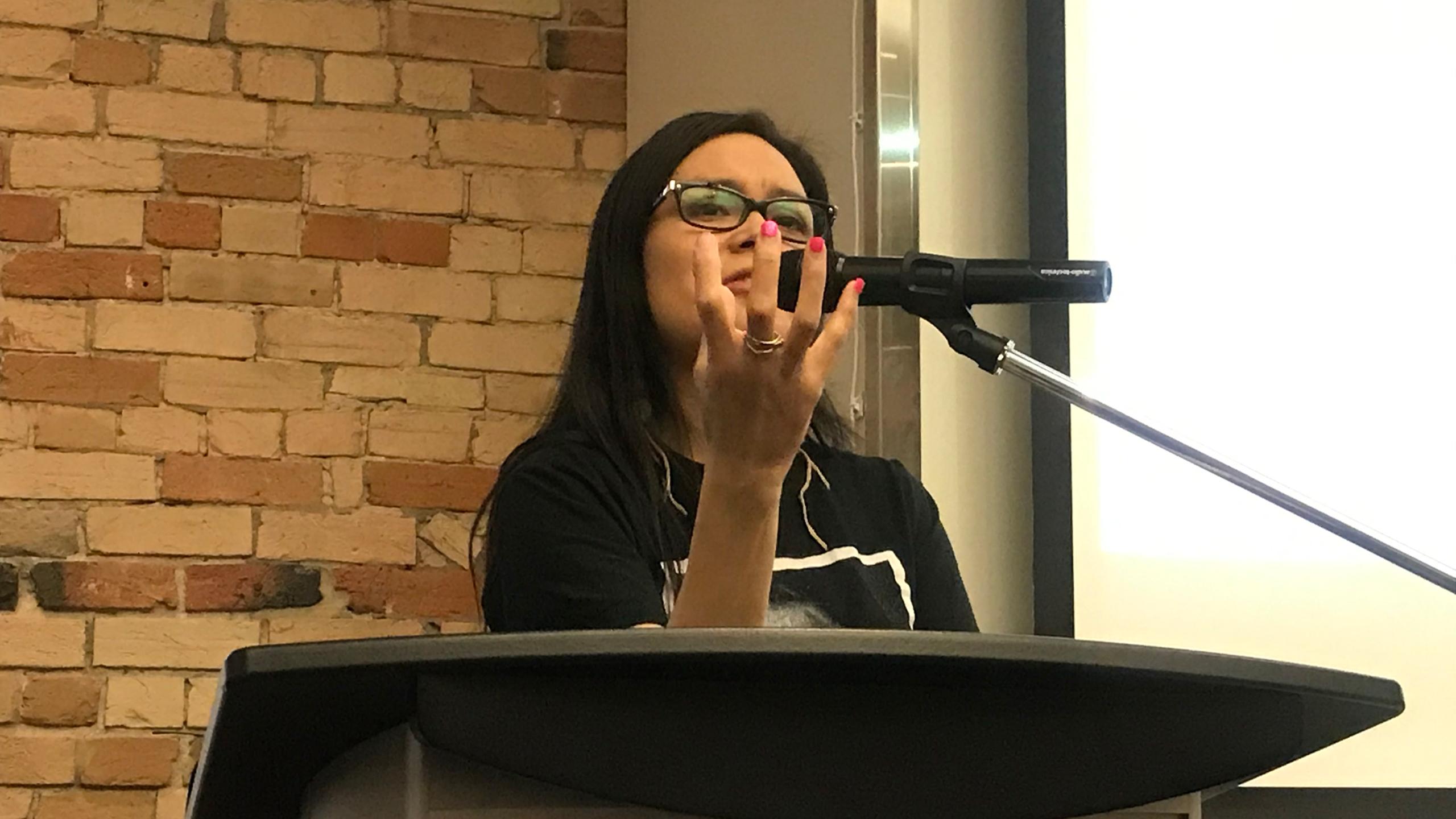By Kashish Hura
CONTENT WARNING: This article mentions sexual abuse and discusses intergenerational trauma
Wet’suwet’en land defender and daughter of hereditary chief, Eve Saint, said it’s more important now than ever before for students to learn about the harsh realities of the conditions at the protest sites.
“We had colonizers tell our history from their point of view, and our real truth was silenced and hidden,” Saint said at a panel discussion at Ryerson on Wednesday.
Saint said we need resources on Indigenous people’s history to be more easily accessible.
“Maybe our parents and grandparents normalized racist mindsets, but that is very damaging, dangerous and violent…we need to stop that cycle of violence”
Saint didn’t know of her own family’s past until she was 18 years old. Her grandmother was sent to St. Anne’s Indian Residential School, which had an electrical chair and a reputation for sexual abuse, according to Saint.
On learning these details, Saint said she became very aware of intergenerational trauma and had to seek a lot of counselling to cope with the stress.
“We had colonizers tell our history from their point of view, and our real truth was silenced and hidden”
The Royal Canadian Mounted Police (RCMP) arrested Saint on Feb. 7 for refusing to leave a blockade against the Coastal GasLink (CGL) pipeline. On the day she was released, the RCMP prompted her to sign on conditions that she is not allowed back on the territory. She refused their terms.
Legal risks of engaging in activism
In Toronto, several people were arrested on Wednesday at a rail blockade in solidarity with Wet’suwet’en.
Unifor National Chair in Social Justice and Democracy and recovering lawyer, Kiké Roach, commented on the legal risks that come with engaging in activism for Indigenous people’s rights.
“Your life’s on the line in situations like these.”
Roach points out that it’s important to work with recognized groups and take instruction from people who have done this kind of thing before.
“Non-violent civil disobedience is a school of thought and it’s something that people have to be training before they just enter into action like that,” she said.
Roach said that law is not synonymous with human rights. “This system of the Canadian legal system is quite prepared to violate its own rulings, including the Supreme Court, including the Canadian Human Rights Tribunal, which has repeatedly told the Canadian government that they are in violation.”
The impact of the CGL pipeline
Saint said her home looks like a warzone now, with helicopters flying in and out everyday.
“We were in green tents, bundled up, eating outside and going to the bathroom outside.” she said.
“Go to…all institutions that discriminate, marginalize and oppress Indigenous people, and request them to be less violent against us”
If the pipelines are approved, camps will be set up for about 1000 construction workers. According to Saint, this means resident Indigenous peoples are more likely to experience violent and sexual assaults.
“We’re not going to see a natural gas pipeline, we’re going to see a pipeline of drugs…a pipeline of fentanyl, overdoses, alcoholism and sex trafficking,” Saint said.
She said the plan to steal Indigenous land is yet again rooted in environmental racism.
How non-Indigenous students can support
Executive Director of the Yellowhead Institute, Dr. Hayden King, was also present at the panel. King advised students, especially if they’re non-Indigenous, to show support towards Indigenous people.
“Go to your university spaces, healthcare and criminal justice system spaces, natural resource regimes and all institutions that discriminate, marginalize and oppress Indigenous people, and request them to be less violent against us,” said King.
He said that students have a lot of power at their disposition, and must ask themselves whether their actions are dismantling settler colonialism, or contributing to it.
Mature policy and governance student Sigrid Joseph, now in her 50s, grew up next to the Mohawk reserve of Kahnawake in Montreal and had many Indigenous friends growing up.
She said she shared a connection and common goal with her Indigenous friends as a black person of colour. “We share the same challenges and the fight should be more intersectional.”
“Canada doesn’t have Jim Crow Laws, because they don’t need any to enforce segregation and racism”
She remembers not being allowed to take the bus to school growing up and how all the racialized students were made to sit at the back of the class.
“Canada doesn’t have Jim Crow Laws, because they don’t need any to enforce segregation and racism,” Joseph said, “What’s happening in Wet’suwet’en right now is the Civil Rights Movement of our time.”
Resources recommended by panel
The Unist’ot’en camp has a tool kit for supporters and information on how to donate. They also have a legal fund for the many people who continue to get arrested for protecting their land.
Gidim’ten Checkpoint’s twitter account posts live updates on the situation.
The Yellowhead Institute has web summits and tool kits for supporters.
The event was also live-streamed on Facebook.










Leave a Reply